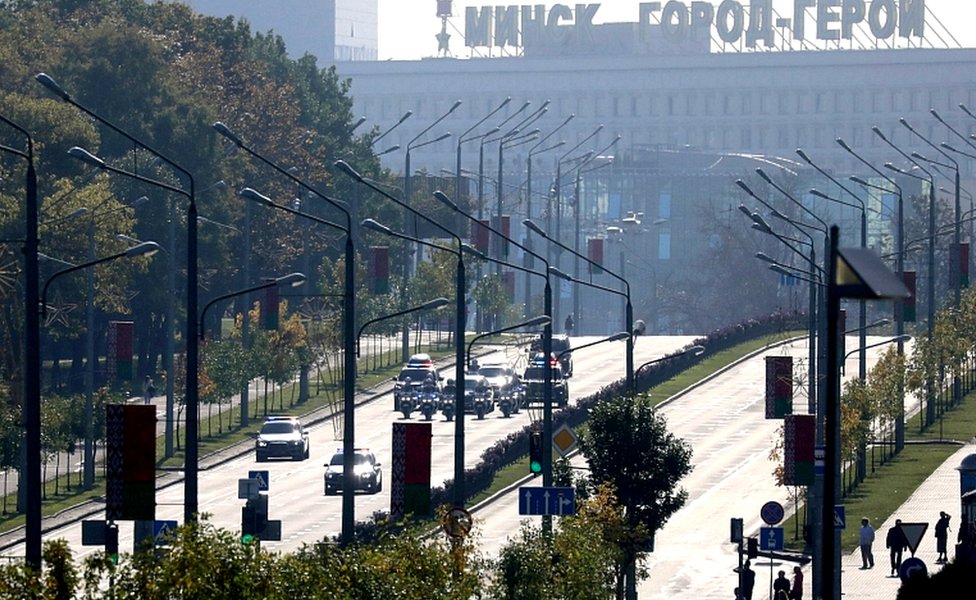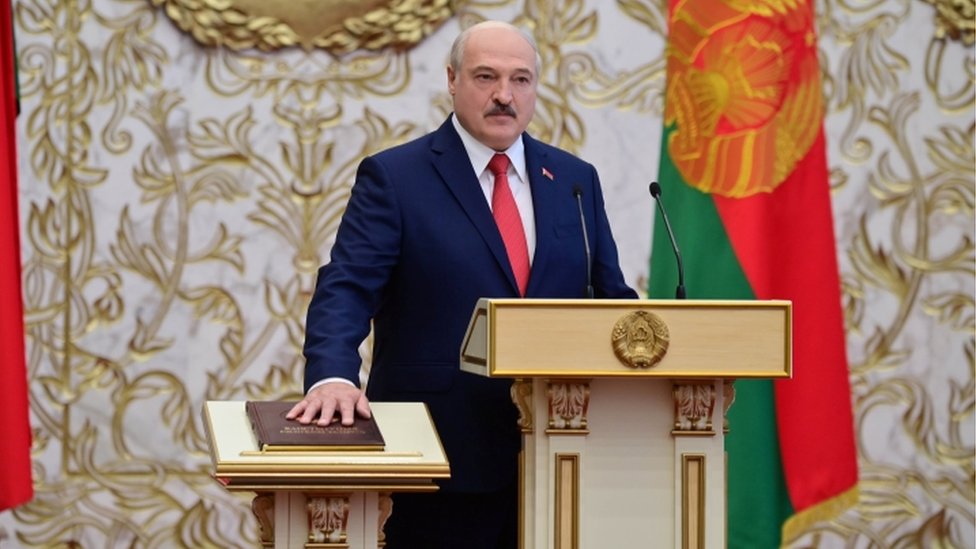CLOSES MINSK FOR CEREMONY
FOOLING NOBODUY
BBC
Belarusian presidential election 2020
 I
IMAGE COPYRIGHTREUTERSi
President Lukashenko's motorcade swept through Minsk
Belarus President Alexander Lukashenko, whose re-election in a disputed poll last month led to weeks of mass protests, has been inaugurated for a sixth term in an unannounced ceremony.
State media said several hundred people attended the ceremony at the Palace of Independence in central Minsk.
Streets were sealed off as Mr Lukashenko's motorcade raced through the city, witnesses said.
One opposition politician likened the event to a secret "thieves' meeting".
Presidential inaugurations are normally publicised well in advance as major state occasions.
Instead, state news agency Belta reported on Wednesday: "Alexander Lukashenko has taken office as President of Belarus. The inauguration ceremony is taking place in these minutes in the Palace of Independence."
Europe's longest-serving ruler under fire
What's happening in Belarus?
'Breathing freedom': Belarusians hope for change
Belarus President Alexander Lukashenko, whose re-election in a disputed poll last month led to weeks of mass protests, has been inaugurated for a sixth term in an unannounced ceremony.
State media said several hundred people attended the ceremony at the Palace of Independence in central Minsk.
Streets were sealed off as Mr Lukashenko's motorcade raced through the city, witnesses said.
One opposition politician likened the event to a secret "thieves' meeting".
Presidential inaugurations are normally publicised well in advance as major state occasions.
Instead, state news agency Belta reported on Wednesday: "Alexander Lukashenko has taken office as President of Belarus. The inauguration ceremony is taking place in these minutes in the Palace of Independence."
Europe's longest-serving ruler under fire
What's happening in Belarus?
'Breathing freedom': Belarusians hope for change
Mr Lukashenko, who has ruled the former Soviet republic for 26 years, said Belarus needed security and consensus "on the brink of a global crisis", an apparent reference to the coronavirus pandemic, Belta reported.
"I cannot, I have no right to abandon the Belarusians," he added.


REUTER Alexander Lukashenko placed his hand on a copy of the constitution and swore the oath of office

Lukashenko busses in the party faithful
Analysis by Jonah Fisher, BBC News

Lukashenko busses in the party faithful
Analysis by Jonah Fisher, BBC News
This was not the confident inauguration of a man who really believes he has 80% of the country behind him. Everything about it was aimed at avoiding a public reaction.
There was no prior warning that the ceremony would take place, and even when proceedings were under way there were no live broadcasts on state television or radio. An audience of loyal officials was bussed in and there appear to have been no foreign dignitaries. Not even the Russian ambassador was invited.
Belarus's opposition immediately called for fresh demonstrations. But there are valid questions about where Belarus's protest movement is going.
Though the anti-Lukashenko demonstrations still muster large crowds, particularly at the weekend, they have not led to major fissures in the president's support base. The security forces and army are still loyal and events (like the weekend rallies) that were once incredible and unprecedented are now regular and almost routine.
It is clear that Russia - Belarus' most important ally - sees President Lukashenko as the "least worse" option at the moment. While that remains the case Belarus's leader seems determined to ignore the protests and carry on.

How has the opposition reacted?
His main political rival, Svetlana Tikhanovskaya, who fled to neighbouring Lithuania amid mass arrests, said Mr Lukashenko "after today is neither a legal nor a legitimate head of Belarus".
Fellow opposition politician Pavel Latushko posted on social media: "Where are the jubilant citizens? Where is the diplomatic corps?"
"It is obvious that Alexander Lukashenko is exclusively the president of the Omon (riot police) and a handful of lying officials."
He called for "an indefinite action of civil disobedience".
The opposition Nexta Live channel on the Telegram messaging app called for street protests from 18:00 local time (15:00 GMT) and urged drivers to block roads and create traffic jams.
"Starting from this very day, he [Lukashenko] officially becomes a bandit and fraudster who is not recognised anywhere in the civilised world," the channel said.
Meanwhile, Lithuanian Foreign Minister Linas Linkevicius described the inauguration as a "farce" and "illegitimate" on Twitter.
What is the background?
Mr Lukashenko, 66, claimed a sixth term as president in the widely disputed election of 9 August. He insisted that he had won fairly with 80% of the vote and depicted the protests against him as a Western-backed plot. Earlier this month, he secured a $1.5bn (£1.2bn) loan from Russia.
Ms Tikhanovskaya claims to have won 60-70% in places where votes were properly counted.
Many opposition figures are now in self-imposed exile in neighbouring countries amid a wave of arrests.
Despite the crackdown, anti-government protests show no signs of diminishing. On Sunday, a crowd of about 100,000 people staged another rally in the capital, demanding that Mr Lukashenko step down
A 73-year-old great-grandmother has turned into an unlikely hero for demonstrators in Belarus
The US Says Alexander Lukashenko Is Not The Legitimate President Of Belarus
The State Department said that Lukashenko's Aug. 9 victory was "fraudulent," as protests across the country continue.
Christopher Miller BuzzFeed News Contributor
Posted on September 23, 2020
Andrei Stasevich / Getty Images
Belarus' Alexander Lukashenko takes the oath of office during his inauguration ceremony in Minsk on September 23.
Eight months ago, Secretary of State Mike Pompeo told President Alexander Lukashenko in a historic visit to Minsk that their meeting was “a solid first step towards improved relationships and closer ties.”
On Wednesday, the US State Department said it did not consider Lukashenko, the embattled Belarusian strongman who has led Belarus with an iron fist for 26 years, to be the president of the country any longer.
"The United States cannot consider [Alexander Lukashenko] the legitimately elected leader of Belarus,” a State Department spokesperson said in a statement to BuzzFeed News on Wednesday.
The spokesperson reiterated that the US did not believe that the Aug. 9 presidential elections in Belarus were free or fair. “The announced results were fraudulent and did not convey legitimacy," the spokesperson said.
Lukashenko, an ally of Russian President Vladimir Putin, claimed that he won 80% of the vote and a sixth term despite reports of fraud in his race against Svetlana Tikhanovskaya, a 37-year-old political novice who captured the nation’s attention with her message of change. Pro-democracy demonstrations immediately erupted across the country, with riot police unleashing a brutal crackdown on protesters who claimed Tikhanovskaya had won.
Tikhanovskaya told BuzzFeed News in an interview from Lithuania, where she lives in exile after being forced to flee Belarus, that she is “the national, chosen president.”
Hours before the US announcement Wednesday, Lukashenko had gathered hundreds of government officials and supporters in Minsk for a secret inauguration ceremony that was neither announced beforehand nor televised.
As Lukashenko took part in the clandestine event under heavy security thousands of demonstrators continued their weeks-long protest on the streets of Belarus. They demand that Lukashenko resign and riot police responsible for abuse and torture of demonstrators face criminal charges.
The US’s decision to not recognize Lukashenko as Belarus’ president marks a significant collapse in relations between Washington and the Eastern European leader often referred to as “Europe’s Last Dictator.”
When Pompeo visited Lukashenko in Minsk in February, he said the two vowed for closer cooperation in the security and economic spheres. The secretary said Belarus had made “real progress” on human rights issues “but there remains work to do.”
The visit followed President Donald Trump’s nomination of senior US diplomat Julie Fisher to be Washington’s next ambassador to Belarus in April. Minsk expelled the last US ambassador and 30 of 35 diplomats in 2008 after Washington tightened sanctions due to worsening human rights abuses.
Fisher faced a Senate hearing about her nomination in August, but it has been held up since the protests erupted in Belarus.
Deputy Secretary of State Stephen Biegun told reporters in a call on September 12 that Fisher “is still in the approval process here inside the United States, and we have not suspended that process.”
Christopher Miller is a Kyiv-based American journalist and editor.
No comments:
Post a Comment